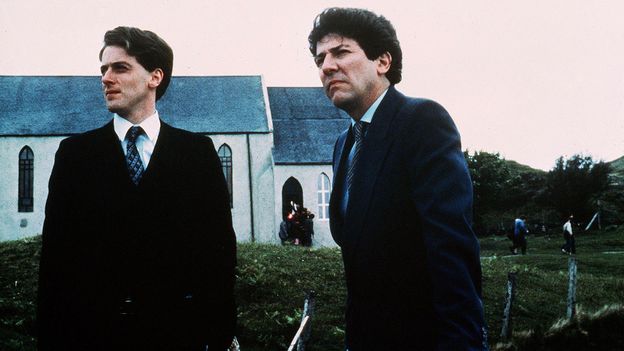Culture
Local Hero: Why the iconic Scottish environmental film was decades ahead of its time

[ad_1]

As it happened, Puttnam and Forsyth had their eye on Lancaster to star in the film from get-go. “The first thing that Bill had said to me when he delivered the screenplay was, ‘I’d like Burt Lancaster to play Happer,” says Puttnam. While securing Lancaster was crucial for the film’s international appeal, this proved extremely difficult as the star’s salary took up half of the film’s budget. It took a year of negotiating to get him on board.
Despite considering stars such as Michael Douglas and Henry Winkler for the role of Mac, Forsyth was set on casting Peter Riegert as the oilman who experiences an awakening and succumbs to the charms of the rugged Scottish landscapes. For the key part of Oldsen, the local guide who escorts Mac around Ferness, Forsyth chose Peter Capaldi, a then fresh-faced Scottish actor just out of art school.
Another integral element of the film is the score by Scottish-born Dire Straits frontman Mark Knopfler, who Puttnam suggested to Forsyth. While it is regarded as a key component of the film, underscoring shots of the Scottish coastline and the Northern Lights, it almost never came about.
“I heard his (Dire Straits) album Making Movies. So, I wrote to him, I got a letter from his manager who said, ‘Oh, that’s really, really interesting’. I got Mark and Bill to meet, Bill didn’t like Mark’s music, so it was a very tense meeting. But Bill liked one track, Telegraph Road. So, I managed to have a meeting where the only track we talked about was Telegraph Road. And, in the end, they got to like each other and they got to work together,” says Puttnam.
Ahead of its time
Released to immediate acclaim, the film was a major success in the UK and in the US, going on to be honoured as one of the top 10 films of the year by the National Board of Review in New York and launching the career of future Doctor Who star and multi-Bafta winner Peter Capaldi. Forsyth – who’d garnered praise for his 1981 sleeper hit Gregory’s Girl – won a Bafta for best direction. It was hailed as “a small film to treasure, a loving, funny, understated portrait of a small Scottish town” by leading US critic Roger Ebert for The Chicago Sun-Times, while Janet Maslin wrote in a glowing review in The New York Times, “Mr Forsyth has put Scottish comedy on the map”.
While Local Hero remains arguably the finest film to have come out of Scotland, perhaps its most enduring legacy lies in its prescient caution on the environment. Fully aware that going ahead with the oil plant will irrevocably damage their village, the locals of Ferness willingly agree to sell their land, rather than oppose the corporation – bar one holdout, a dogged old man.
Well before it was echoed in the incident of the Scottish farmer who refused to sell his land to Trump when he built his golf course, Forsyth’s film implored audiences to conserve the environment, to stand up and fight for it, and to contemplate how easily it can be destroyed.
In the willingness of the residents to sell their land, Forsyth urged viewers to consider the irreversible repercussions of environmental harm. Looking back on the seminal Scottish film 40 years later, Puttnam says he believes it was prescient and is his favourite of the films he has produced: “It was certainly a good 20 years ahead of its time.”
Love film and TV? Join BBC Culture Film and TV Club on Facebook, a community for cinephiles all over the world.
If you would like to comment on this story or anything else you have seen on BBC Culture, head over to our Facebook page or message us on Twitter.
And if you liked this story, sign up for the weekly bbc.com features newsletter, called The Essential List. A handpicked selection of stories from BBC Future, Culture, Worklife and Travel, delivered to your inbox every Friday.
[ad_2]
Source link
Culture
How We Behaved When COVID-19 Robbed Our Culture of Sports

If you’re like me, when the weight of politics, religious debates, and the monotony of mundane life seem to overwhelm the mind, watching sports is a way to recalibrate. So when the coronavirus began dominating headlines, I presumed sports would be the catalyst to put minds and emotions at ease. That vehicle of escapism came to an abrupt halt Thursday, March 12, 2020. This date will be forever remembered in history across the globe as the day sports were put on hold as a precaution to maintain the health of humanity.
So far in 2020, we’ve witnessed tragedy, chaos, and confusion ranging from the death of an NBA legend to the impeachment and acquittal of a U.S. President. And now, the coronavirus—AKA COVID-19—which is now labeled a global pandemic by the World Health Organization, has virtually shut down the staples of American entertainment.
What are we to do without our beloved sports? How can athletes come to grips with their careers halted and having way more time than usual before next season? And how might we respond in a tumultuous time filled with fear for an uncontrollable virus that affects us and our loved ones?
In this way, the COVID-19 pandemic is teaching us that close-knit, human-to-human and face-to-face communal gatherings—the kind we enjoy with sports—still matter.
No sport is unscathed from the coronavirus pandemic, and even as this is written, plans for particular leagues and franchises are fluid. Of course many other countries began halting or altering sporting events much sooner than the United States, but the scale at which this is now affecting the worldwide leader in sports entertainment is telling of the seriousness by which leaders are taking the matter. The chaos began when Dr. Anthony Fauci testified before Congress March 12 regarding the lackluster response our country was taking in regard to social gatherings and the impact it could have on our country’s well-being.
As a result, the NBA suspended its season indefinitely after Utah Jazz center Rudy Gobert and point guard Donovan Mitchell tested positive for the virus. Now, four Brooklyn Nets—including league MVP Kevin Durant—have also tested positive. The NHL postponed its season. NASCAR will have races without fans in attendance. Major League Baseball is canceling the spring season and will postpone opening day by at least two weeks. The NFL canceled their annual spring meeting and is altering plans for the 2020 NFL Draft. The PGA will tee off major tournaments without fans and postpone the annual Masters Tournament. The NCAA Basketball tournament—easily the hardest hit category with March Madness looming—canceled all 14 conference tournaments and the ensuing March Madness Tournament.
The initial response for many athletes is disappointment. As a coach and former college athlete, I know firsthand the amount of time, training, and dedication contestants pour into competition. It’s not easy to accept the loss of play that you’ve worked for all season—or even your whole career. And as a fan, now that sports aren’t available to distract me from this clamorous environment, I have to find other ways to cope. But as a believer, I have a much more important obligation than to wallow in disappointment and boredom.
This track and field season, the high school team I coach has an opportunity to compete for some significant individual and group achievements. For eight months, I’ve witnessed our athletes blossom into believers of each other, themselves, and the sport. Many were just beginning to buy-in to the reality that they could accomplish something beyond their wildest imaginations this year. And now our season has been put on hold—possibly canceled—and we have to put those dreams toward next season instead.
I wonder how our athletes will hold up with such a significant change. Will they be able to bounce back? Will they train on their own to come back prepared? Can they overcome this coronavirus obstacle while I am no longer by their side to motivate and coach them? But as a believer and a coach, I must remember that moments like these are opportunities to grow, to trust, and to remind our athletes that their identity isn’t in what they achieve or won’t achieve this season. What’s before us is an opportunity to remember our inherent value as image-bearers of God, which extends beyond the temporal vainglory of medals and trophies.
This is not to make light of the hard work and focus poured into their sport. In fact, many aspirations of being recruited for college or getting a professional contract rode on the performances of this season. The unfortunate loss of these opportunities are difficult to explain for those who’ve never performed in such extracurricular activities, but I assure you they hold a special place in the hearts of lifelong competitors. And if they hold such a place in the hearts of competitors, they are held almost as dearly to the fans.
Like I mentioned before, sports provide a steady rhythm for our American society. The year unfolds from one sport’s season to another, in a sort of liturgy we can all count on. It provides a recreational sense of escape when the burdens of the world are too much to bear. When all else seems to divide us, sports can bring people of different ages, races, genders, religions, and political affiliations together for a few hours at a time to gaze upon the beauty of equity through competition. Whether we’re for or against the same teams, the communal sense embedded in the rhythms of fandom provides us an expression and sense of self.
In this way, the COVID-19 pandemic is teaching us that close-knit, human-to-human and face-to-face communal gatherings still matter. “Belonging is our primary human need,” as Jeremy Linneman wrote for The Gospel Coalition. God rendered it so since He made mankind (Genesis 2:18). Our human connections—even those around a television, in arenas, or alongside teammates competing—is a basic necessity to feel human. Without these gatherings, part of our humanity is lost. We are created to gather and be in close-knit communities, because it’s the nature of our Creator. So even when we cannot gather around sports, we can look to the values we gain from these rhythms—these liturgies—to guide our reaction to the uncertainty caused by COVID-19.
Though we are aware of the situation and lament what is temporarily lost in this moment, competitors and fans can lift their eyes and focus their gaze beyond the fear and distress. Dayton Flyers basketball forward Obadiah Toppin, a front-runner for the Naismith Men’s College Player of the Year Award, was looking forward to putting his skills on the national basketball stage in this year’s NCAA Basketball Tournament. But with that reality stripped away, Toppin fixed his gaze on God in the midst of the ongoing confusion—and encouraged others to do so too—with this retweet:

Remembering what’s eternal certainly puts into perspective what’s happening day to day. But that doesn’t mean we adopt a laissez-faire attitude regarding the outbreak, such as exhibited by some leaders. Downplaying the virus’s contagion or chastising others who take the proper health precautions is not helpful, as our Italian neighbors regrettably learned. Some claim all the precautions by state and local governments are overblown and are ruining sports. Some even incite apocalyptic fear as reason to why the virus is spreading while encouraging church members to gather en masse as though the virus doesn’t even exist.
Throwing caution to the wind, however, is not prudent or wise. Considering that African Americans, people with underlying illnesses, and elderly populations are at a greater risk of death from the coronavirus should make us pause before doing whatever is preferred personally—not to act out of fear, but out of love and regard for our neighbors. If choosing to not attend crowded events that ramp up the spread of COVID-19 will lower the chances of spreading it to my 80-year-old grandmother or neighbor, that is a sacrifice worth taking. The immediate satisfaction of participating in a sport does not hold a candle to the health and vitality of human lives.
We need more people with others’ centered behavior, rooted in a greater hope, who will not succumb to anxiety and fears of the unknown, but who also act with wisdom and prudence. This is exemplified by President Scogin of Hope College, when he announced one of the college’s students was being tested for COVID-19. Scogin encouraged everyone first to pray and to not engage in gossip, belittling, or discrimination. He also presented clear guidelines about what the college would do practically to provide support for the students. And last, he reminded everyone that “we are a people of hope” and that “we can and we should respond to this differently than the rest of the world is responding to this… we prepare, we plan, and we pray.”
That simple, calm approach is what we need in this time of unknowns. While sports are no longer present to distract us or help us build the community we need, all is not lost. Sports have shaped us, our whole society, and now in its absence we can see it all the more clearly. Like any other good thing, sports can be elevated to an idol-like status in our hearts and our society. But the powerful good of sports—for athletes, coaches, and fans—cannot be denied. This momentary pause is a reminder to reassess its place for us individually and collectively. And it’s a time to be grateful for the joy it brings, giving witness to an everlasting hope in Jesus who is Lord over all.
Culture
Last Prisoner Project Facing Down COVID-19 Alone, But You Can Help

CANNABIS CULTURE – It’s critical that our response to this global Coronavirus pandemic protects our most vulnerable people – including our incarcerated communities.
Of the 2.3 million incarcerated people in the U.S., roughly 165,000 are over the age of 55. Compared to the general population, people in jail and prison are more likely to have pre-existing health conditions. These groups of people are most at risk of falling ill or dying from the coronavirus, or COVID-19.
Failing to act could expose tens of thousands of people in prisons and jails across the country to the virus. Given the crowded nature of our correctional institutions, an outbreak is likely and would not only endanger people in prisons but also correctional staff and outside communities.
Sign this petition if you agree that public officials should take steps to protect people in prison or jail from the virus as well as preserving contact with loved ones on the outside.
Mass incarceration has left prisons and jails highly susceptible to an outbreak given overcrowding, lack of resources, and little access to medical care. To address this situation public officials need to take steps to reduce overcrowding and ensure access to medical care as well as access to communication with loved ones. These steps include:
- Identifying people who are scheduled to be released from prison or jail in the next six months and release them into home confinement.
- Parole prisoners over the age of 65, with priority given to those who have underlying health conditions that make them particularly susceptible to the virus.
- Individuals who have successfully completed at least three years of supervision should be transferred to administrative supervision or have their supervision terminated altogether.
- Suspend copays for medical visits made by incarcerated persons. It is cruel and unusual punishment to deny access to lifesaving medical care to incarcerated individuals simply because they can’t afford it. This is particularly unjust when considering prisoners often work for less than a dollar a day, including those making hand sanitizer for the state of New York.
- Correctional facilities across the country have drastically reduced or completely eliminated visitation. In normal times, we would point to the significant evidence that sustained meaningful contact with family and friends benefits incarcerated people in the long run, including reducing recidivism. But it is even more important, in this time of crisis, for incarcerated people to know that their loved ones are safe and vice versa. While many facilities have suspended in-person visitation, only a few have made an effort to supplement this loss by waiving fees for phone calls and video communication. We must ensure FREE access to smart visitations and phone calls for all incarcerated individuals.
- RELEASE ALL CANNABIS PRISONERS. No one incarcerated for a victimless cannabis offense should continue to be incarcerated today. Now is the time to free our cannabis prisoners and further reduce the risk of outbreaks in correctional facilities.
Culture
Musical notes: how male pop stars are making love songs all about them
Boys in love
Laura Snapes, deputy music editor
Pop’s leading men once kept their love lives secret to preserve the illusion of availability. But today’s fans aren’t naive, and social media have made most major musicians’ dating lives into a soap opera whose narrative they would rather control. Post #MeToo, simply objectifying your significant other (or slagging off an ex) sits less well, so a generation of pop boys have embraced a softer side of masculinity, opening up about how love has changed them or how they’re not worthy of its saving graces.
While male sensitivity is still in perilously short supply, generally, these gambits feel like the equivalent of a 1950s businessman having his boss over for dinner to use his stable home life as a ploy for promotion. When Ed Sheeran sings about leaving the party to go and hang out with his wife, he’s signalling his superiority over shallow social gadflies. When Justin Bieber sings about his wife, Hailey Baldwin Bieber, on his latest album Changes, he isn’t telling us about her interior life or why he loves her beyond the fact that she’s a) super hot, b) apparently perpetually available to him; he’s using marriage as a panacea to telegraph his maturity after all that unfortunate business with drugs, the abandoned monkey, terrorised neighbours, etc. Bieber is Wife-Worthy now, and that is all he needs us to know.
James Blake has half a decade on Bieber, but his 2019 album Assume Form didn’t offer much more in the way of personal introspection. He tirelessly surveyed how his relationship has made him a better man, a better lover; how the gift of love exposed his flaws and precisely what those flaws are. The effect was less radical emotional transparency than the album-length equivalent of the meme in which girls in clubs look bored out of their skulls while blokes chew their ear off. It’s a beg for a pat on the back and the acknowledgment of his good man bona fides – a trait equally present in recent tracks by Stormzy (Lessons) and Harry Styles (Falling), in which they admit to disrespecting their former partners, then do pretty much precisely that all over again by dragging their private business into the spotlight.
There’s a fine line between sensitivity and self-aggrandisement, one that both King Krule’s Archy Marshall and Tame Impala’s Kevin Parker get on the right side of on their new albums. While making Man Alive!, Marshall had his first kid and moved north, away from his lifelong home in the capital, to be with his partner. In his inimitable slack-jawed bark, he finds his footing in domesticity. “Passport in my pocket’s getting old / Feel the weight of the world dissolve,” he sings on Airport Antenatal Airplane, as he learns to settle. Theme for the Cross invokes Óscar Alberto Martínez Ramírez, who drowned with his 23-month-old daughter Angie Valeria as they tried to cross from Mexico to the US, in a contemplation of the seriousness of fatherhood. His family role neutralises his youthful nihilism: “Why stop reading when the page is about to turn?” he asks on Energy Fleets. The sound of this autodidact opening up, asking his lover to complete him and offering himself in return, feels quietly profound.
Tame Impala’s The Slow Rush charts a similar evolution. Parker’s 2015 album Currents was mired in solitude; his new album finds him newlywed and staring at the horizon. Unlike Bieber, he doesn’t frame marriage as a full stop, but a risk worth taking, a mutual leap into the unknown. “I know we promised we’d be doing this till we die, and now I fear we might,” he sings on One More Year. The long haul takes work and reciprocity; Parker’s facility with turning the hard yards into his most complex and well-balanced album yet suggest a man up to the task.
Is equality at festivals becoming the new normal?
Alexis Petridis, chief music critic
This year seems to be turning into an annus horribilis for festivals. At the time of writing, Covid-19 has yet to claim any UK events, but the outlook seems grim: according to a tweet from Against Me’s Laura Jane Grace, insurance companies are putting pressure on artists to pull out of events by changing their terms, so artists aren’t covered if tours or festivals are subsequently cancelled due to coronavirus.
But let us ignore the pandemic and dwell instead on one quietly positive development. For years now, people have complained about the vast gender disparity at festivals, with posters edited to remove the male artists (leaving a largely blank poster with a few names desultorily dotted around). People have got angry, others have been dismissive, while some have suggested that – like the lack of female representation at this year’s Brit awards – it’s not really the festival organisers’ fault, but rather a deeper-rooted problem with the music industry and its inability to develop female artists.
There’s certainly a lot of truth in that argument. It’s hard to think of a mainstream pop or rock genre, past or present, that isn’t, or wasn’t, dominated by men. Off the top of my head, I can only come up with disco, where female stars – Gloria Gaynor, Patti LaBelle, Grace Jones, Loleatta Holloway, First Choice – outnumbered their male counterparts.
But even so, something quietly appears to be shifting in the world of festival bills. Wide Awake, scheduled to be held in Brixton’s Brockwell Park in June and headlined by Metronomy and Black Midi, has a noticeably balanced lineup: Goat Girl, Sheer Mag, Dream Wife, Marie Davidson, Los Bitchos and Lena Willikens all feature. The organisers say they hope their “blueprint for booking” will encourage other festivals. The recent Rockaway Beach festival – held at Butlins Bognor Regis in January – didn’t sport the kind of glaring disparity that you might expect from an event catering to indie fans of a certain age. Higher up the scale, in 2019, Primavera embraced a 50/50 split as the “new normal”, and now doesn’t even make mention of its gender parity, but just gets on with it.
Wide Awake also say they want the industry “to view 50/50 gender spilt lineups as the norm”, with promoter Tash Cutts saying: “A gender-equal billing should not be a cause for celebration.” Wide Awake’s booking policy isn’t mentioned anywhere on the festival’s website, which devotes a lot of space to its other worthy aspect, a robust environmental policy including a pledge for zero landfill. None of these festivals seems to want a medal for their efforts, they’ve just gone ahead and done it, as if it’s entirely normal. Which, of course, it should be.
Unearthing Kenny Carter, soul’s unluckiest lover
Ben Beaumont-Thomas, music editor
A genre coinage that has never really caught on, but perhaps should, is “deep soul”, the name given by record collector Dave Godin to a certain kind of emotionally raw mid-century soul music informed by the downbeat lyrical themes of the blues. Godin’s compilations of this stuff, Deep Soul Treasures (on Ace Records), are full of fleetingly famous soul stars whose seven-inch singles a certain kind of pork pie-hatted gentleman would spend his children’s university fund on, but the rest of us have never even heard of.
One such artist I’ve discovered via volume five is the wonderful 1960s also-ran Kenny Carter. Biographical info is scant – he was signed to RCA but walked out on the deal and into obscurity, apparently – but you can reasonably surmise that his love life was, to be frank, an absolute shitshow.
There is no kind of breakup that Carter seemingly hasn’t gone through, or weathered with anything but extremely poor judgment. What’s That on Your Finger sees him bump into his ex, instantly tell her how lonely he is and ask to take her hand, and … well, the horror in his voice suggests the question of the title is rhetorical. On How Can You Say Goodbye, he hopes his ex is just playing a game by leaving him – that seems unlikely, Ken, and even if she was, that would make her an absolute monster who you shouldn’t be with anyway. Don’t Go begins with a note of acceptance that is quickly and ill-advisedly swept aside: “I can’t make you stay, but I’ve gotta try,” he sings, launching into a histrionically pained chorus where he – never a good look, this – badmouths her new boyfriend. All his songs seem to be addressed directly to the woman in question while aggressively clasping her hands, except I’ve Gotta Find Her, which is addressed to his mates just before running off to address the woman in question, aggressively clasp her hands, etc. If it was today, those mates would be organising an intervention via a specially created WhatsApp group.
All of which makes his ballad I’m Not the One quite heroic in its maturity. It begins with Carter binning off the woman himself. Surely not? It turns out he’s magnanimously ending what sounds like a pretty decent relationship – the kind you suspect a lot of people got into in an era that demanded swift marriage – with someone who just doesn’t have the hots for him: “You only love me like a brother, and it would be so wrong for me to stay.” Plot twist! The final verse reveals there’s another guy involved – not only is Carter giving up the woman he loves, he’s giving her up to the man he knows she loves more. It is a really unusual song, dignified and moving with a horribly believable love triangle.
I’m Not the One is aided by some of the finest production I’ve ever heard in 60s pop, with waltzing Walker Brothers-style strings. Prior to reappearing on Deep Soul Treasures, it was only previously available in an inferior Larry Banks version without the backing vocals – a reminder that, as well as Kenny Carter being the most unfortunate man in soul, there are still perfect musical diamonds out there waiting to be unearthed.
Further reading
John Andrew Higgins
(@blueicehiggins)What does a 9 inch ice core sound like when dropped down a 450 foot hole? Like this! Credit to @peter_neff for the idea and @Scripps_Polar, @sciencejenna, @GeosciencesPU, @US_IceDrilling, and @paleosurface for the execution! pic.twitter.com/pW7LxKdbUB
Chris’s writing is always required reading, but in the intro to his excellent appraisal of Beatrice Dillon’s equally excellent debut album, he links to a clip of some polar scientists dropping a nine-inch ice core down a 450ft ice hole. The sound it makes is mindblowing: someone (Dillon?) needs to make an hour-long mix of it, stat.
Grimes live from the future, Brian Hiatt, Rolling Stone
Grimes has been pretty press-shy on the campaign for her latest album, Miss Anthropocene. Rolling Stone got the most in-depth profile, with Hiatt spending two days with Claire Boucher on the grounds of the massive Los Angeles complex where she lives with Tesla founder/boyfriend Elon Musk. It’s easy for Grimes’s reputation to shadow the reality of her art and existence, and this revealing piece does a good job of getting past the nonsense that builds up around her.
Sturgill Simpson has a lot to get off his chest, Steven Hyden, Uproxx
Burning more bridges than Michael Bay on a blockbuster budget, the alt-country star goes off on his (now presumably former) record label, the alleged Grammys corruption and his hatred of touring in this remarkable and invigorating interview.
Your thoughts
Every month we’d love to hear your thoughts about any music that you’ve been loving, or indeed hating but have strong opinions on nonetheless. Post your observations in the comments below and we’ll post some of the best ones next month.
This month, PeterlooSunset says: “Traditionally the first few months of the year are ebb tide for new music, and 2020 is no different. But I’ve been completely blown away by a new album called The Myth of Separation and Selfhood by Tongues of Light, a project of Lancashire avant-folk musician Sam McLoughlin. The album splices together various audio snippets from New Age healing videos and the like on YouTube, in particular videos containing a modern variation of speaking in tongues called Light Language, and sets them to music to staggering effect. Tongues of Light’s long form ambient pieces, stylistically lying somewhere in between New Age proper and the music of Laurie Anderson, are the perfect antidote to the disastrous fast food effect that algorithms catering to Spotify ADHD are having on contemporary pop music.”
Texavery, meanwhile, mused on observations about David Gray and a certain kind of 00s comfort pop: “I used to wish I was born old enough to remember the 60s or punk, but luckily I absorbed the fallout from the rave scene and subsequent creativity of music – eg Leftfield, Portishead/Massive Attack, Super Furry Animals etc. To me, David Gray represents the excitement funnelled into a style of music that really required no emotion or energy – not that I’m knocking it at all but I guess it represents a time of comfort and smooth sailing. It’s hardly surprising radio stations like Virgin still have him on heavy rotation. Whatever gets you through the day.”
-

 Politics5 months ago
Politics5 months agoFEMA Staff Accused of Withholding Aid from Trump Supporters After Hurricane – Calls for Hate Crime Charges and Jail Time Emerge
-

 Entertainment5 months ago
Entertainment5 months agoGeorge Clooney’s Final Stand: Hollywood Icon QUITS Politics for Good After Kamala Harris’ Slip and Trump Triumph
-

 Politics1 year ago
Politics1 year agoTucker and President Trump explore Bedminster and talk about “America’s favorite sport” and what happens if you misbehave at Bedminster
-

 Politics5 months ago
Politics5 months agoPolish President Andrzej Duda Reportedly Visits Mar-a-Lago to Meet with Donald Trump
-

 Politics1 year ago
Politics1 year agoEXPOSED: JOE BIDEN TRAGEDY ADULT VIDEO PUBLISHED BY TUCKER!
-

 Politics5 months ago
Politics5 months agoTrump’s Bold Move: Dan Bongino for Secret Service Director? The Inside Scoop on Security and Threats!
-

 Politics5 months ago
Politics5 months agoFormer Disney and Pixar Designer Sentenced to 25 Years for Child Exploitation and Human Trafficking
-

 Politics5 months ago
Politics5 months agoTrump’s Bold Move: Appoints Hardline Border Czar to Launch Mass Deportations – “Kamala, You’re FIRED!
-

 Politics5 months ago
Politics5 months agoMSNBC in Flames! Pelosi Blames Biden for Kamala Endorsement—A Turning Point for the Democratic Party?






